初中英语语法—一般过去时详解和习题
初中英语语法专项:一般过去时
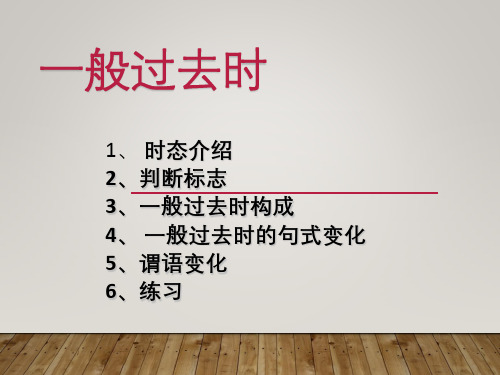
• 6S. Mhey misonth’tergliokeins ghertostugdoenstsh.o(变pp一in般g疑to问m句o)rrow.
写出下列动词的过去式:
go
went
use
think thought live
be
was/ were wake
happen happened keep
give gave
say
become became clean
get got
buy
rain rained play
stay stayed learn
pass passed see
answer answered read
used lived woke kept said cleaned bought played learnt/ed saw read
run ran borrow borrowed grow grew watch watched write wrote smile smiled open opened begin began swim swam carry carried study studied
4、一般过去时句式变换
一般过去时态句式的构成
陈述句式
动词
肯定式
否定式
I was ….
I was not(wasn’t)….
He /She/it was…. He/She/It was not(wasn’t)…. be We/You/They were …. We/You/They were not
•元浊 /d/ ,即 ed 在元音,浊 辅音后面念 /d/ ,
初中英语语法 一般过去时 基本结构 详解 习题
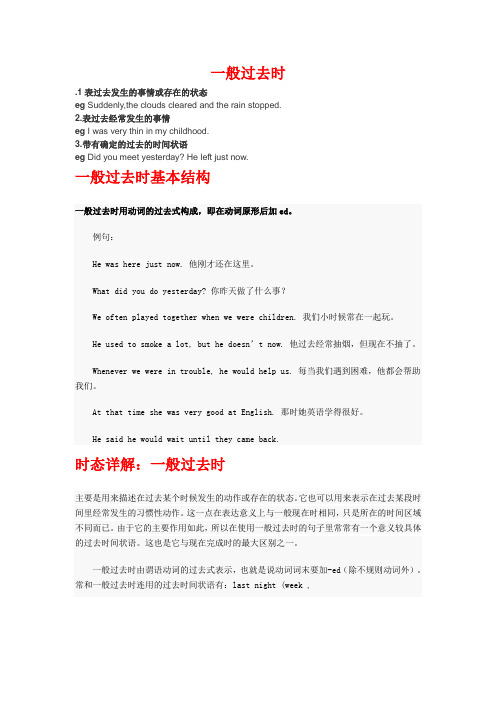
一般过去时.1表过去发生的事情或存在的状态eg Suddenly,the clouds cleared and the rain stopped.2.表过去经常发生的事情eg I was very thin in my childhood.3.带有确定的过去的时间状语eg Did you meet yesterday? He left just now.一般过去时基本结构一般过去时用动词的过去式构成,即在动词原形后加ed。
例句:He was here just now. 他刚才还在这里。
What did you do yesterday? 你昨天做了什么事?We often played together when we were children. 我们小时候常在一起玩。
He used to smoke a lot, but he doesn’t now. 他过去经常抽烟,但现在不抽了。
Whenever we were in trouble, he would help us. 每当我们遇到困难,他都会帮助我们。
At that time she was very good at English. 那时她英语学得很好。
He said he would wait until they came back.时态详解:一般过去时主要是用来描述在过去某个时候发生的动作或存在的状态。
它也可以用来表示在过去某段时间里经常发生的习惯性动作。
这一点在表达意义上与一般现在时相同,只是所在的时间区域不同而已。
由于它的主要作用如此,所以在使用一般过去时的句子里常常有一个意义较具体的过去时间状语。
这也是它与现在完成时的最大区别之一。
一般过去时由谓语动词的过去式表示,也就是说动词词末要加-ed(除不规则动词外)。
常和一般过去时连用的过去时间状语有:last night (week ,month , year , century , etc.) , yesterday , the day before yesterday , yes terday morning ( afternoon , evening ) , in 1999 , two hours ago ( one week ago , tree years ago , …)等等。
完整版一般过去时习题及答案

一般过去时一、用法1.表示去某个生的作或存在的状。
I got up at 7 : 00 yesterday morning.昨天清早我七点起床的。
2. 表示去常或屡次生的作,能够与always, often, sometimes等度副用。
I often had lunch at school last month.上个月我常在学校吃午餐。
二、表形式1. 句中含有 be , be 改成 was (主是第一或第三人称数 )或 were (主是第二人称或第一、三人称复数 )。
I was at home at that time.那我在家里。
2.若是句中有,使用的去式。
She went to Jinan last Sunday. 上周日她去南了。
3.句式(1)含有 be 的一般去的各种句式:①必定句:主+ was/were+其他.Linda was thirteen last year. 昨年琳达13 。
②否定句:主+was/were+ not+其他.Mary was not good at math.不擅数学。
③一般疑句:Was/Were+主+其他?必定回答: Yes, 主+ was/were.否定回答: No, 主+ was/were+ not.— Was Mary ill last week? 上周生病了?— Yes, she was. 是的,她生病了。
(2)含有的一般去的各种句式:①必定句:主+的去式+其他.Mike went to the cinema yesterday evening.昨天夜晚克去看影了。
②否定句:主+didn't +原形+其他.My mother didn't go to work yesterday. 昨天我没去上班。
③一般疑句:Did +主+原形+其他?必定回答: Yes, 主+ did.否定回答: No, 主+ didn't.— Did she go to the zoo? 她去物园了?— No, she didn't. 不,她没去。
初中英语语法一般过去时及练习题
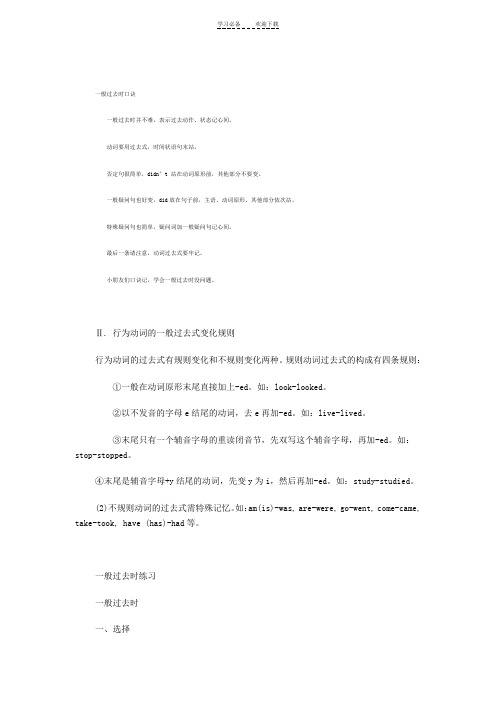
一般过去时口诀一般过去时并不难,表示过去动作、状态记心间。
动词要用过去式,时间状语句末站。
否定句很简单,didn’t 站在动词原形前,其他部分不要变。
一般疑问句也好变,did放在句子前,主语、动词原形、其他部分依次站。
特殊疑问句也简单,疑问词加一般疑问句记心间。
最后一条请注意,动词过去式要牢记。
小朋友们口诀记,学会一般过去时没问题。
Ⅱ. 行为动词的一般过去式变化规则行为动词的过去式有规则变化和不规则变化两种。
规则动词过去式的构成有四条规则:①一般在动词原形末尾直接加上-ed。
如:look-looked。
②以不发音的字母e结尾的动词,去e再加-ed。
如:live-lived。
③末尾只有一个辅音字母的重读闭音节,先双写这个辅音字母,再加-ed。
如:stop-stopped。
④末尾是辅音字母+y结尾的动词,先变y为i,然后再加-ed。
如:study-studied。
(2)不规则动词的过去式需特殊记忆。
如:am(is)-was, are-were, go-went, come-came, take-took, have (has)-had等。
一般过去时练习一般过去时一、选择( ) 1. What _____they _____dinner yesterday ?A. do; have forB. did; had forC. did; have forD. were; have for( ) 2. One of us ______band last month.A. leavesB. leaveC. leavedD. left( )3. I stayed in the sitting room and ____my friends all the time.A. talk toB. talkedC. talk aboutD. talked to( )4. I went to see you last Saturday, ____there ____nobody in the room.A. but; wasB. and; wereC. and; wasD. but; is二、用所给词的适当形式填空3. My father________ (buy) a new computer for________ (I ) yesterday.4. He often ______ (go) to school by bike, but last year heoften _________ (walk) to school.5. After she finished _______ (pack) everything, she ________(go) to bed.6. ---- Who______(wash) the plates on the table ?---- Jenny did.7. ---- When _______ you_____ (see ) the film “ Titanic”?8. It’s half past eleven now. Jim_____(have) lunch. He usually______(have) it at this time.9. She ______(write) to Jill last month. She _________(write) to him next time.10. The students ________ (stop) talking when their teacher came up.三、单句改错:下面每句均有一处错误,指出并加以改正1. Did you found the answer to thisquestion?2. Mary and her brother was born on the sameday.3. We start this lesson about ten minutesago.4. She hadn’t anything for breakfast this morning.5. They came here for ayear.6. Amy singed a song for us at thatparty.7. He said he will help me with my English when he was free.8. The man saw the bag until it waslate.一、. 句型转换1. The children had a good time in the park.否定句:__________________________________________一般疑问句:________________________________________对划线部分提问:____________________________________2. There were about nine hundred people at the concert.(音乐会) 否定句:__________________________________________一般疑问句:________________________________________对划线部分提问:____________________________________3. There was only one problem.否定句:__________________________________________一般疑问句:________________________________________肯定/否定回答:____________________________________4. Ann did her homework yesterday evening.否定句:__________________________________________一般疑问句:________________________________________对划线部分提问:____________________________________5. Last week I read an English book.否定句:__________________________________________一般疑问句:________________________________________肯定/否定回答:____________________________________对划线部分提问:____________________________________二、写出下列动词的三单现、过去式和现在分词go ______ _______ _______ enjoy _______ _______ ________buy ______ ______ _______ eat______ _______ _______get _______ _______ _______ walk ________ _______ ________take______ ______ ______ dance_______ ________ _______write _______ ______ ______ run______ _______ _______swim_______ _______ _______ find _______ _______ _______begin______ ______ ______ eat ______ _______ ______play ______ ______ _______ study ______ ______ ________三. 用所给词的适当形式填空。
初中英语语法一般过去时及练习题

一般动词过去时用法讲解一般过去时表示过去某个时间发生的动作或存在的状态。
常和表示过去的时间状语连用。
如:last year, yesterday等;也可表示过去经常反复发生的动作,常和often, always等频率副词连用。
编辑点评:一般动词的过去时由“主语+ 动词过去式”构成。
一般动词的过去时没有人称和数的变化,因此主语即使是第三人称单数,也和其他人称一样变化。
一般过去时口诀一般过去时并不难,表示过去动作、状态记心间。
动词要用过去式,时间状语句末站。
否定句很简单,didn’t 站在动词原形前,其他部分不要变。
一般疑问句也好变,did放在句子前,主语、动词原形、其他部分依次站。
特殊疑问句也简单,疑问词加一般疑问句记心间。
最后一条请注意,动词过去式要牢记。
小朋友们口诀记,学会一般过去时没问题。
Ⅱ. 行为动词的一般过去式变化规则行为动词的过去式有规则变化和不规则变化两种。
规则动词过去式的构成有四条规则:①一般在动词原形末尾直接加上-ed。
如:look-looked。
②以不发音的字母e结尾的动词,去e再加-ed。
如:live-lived。
③末尾只有一个辅音字母的重读闭音节,先双写这个辅音字母,再加-ed。
如:stop-stopped。
④末尾是辅音字母+y结尾的动词,先变y为i,然后再加-ed。
如:study-studied。
(2)不规则动词的过去式需特殊记忆。
如:am(is)-was, are-were, come-came, take-took, have (has)-had read/ri:d/—read/red/ say/sei/—said/sed/ know—knew put—put go—went get—got see—saw take—took do—did一般过去练习一、选择( ) 1. What _____they _____dinner yesterday ?A. do; have forB. did; had forC. did; have forD. were; have for( ) 2. Could you tell me what time the plane ?A. leftB. leavesC. leavedD. was leaving( ) 3. One of us ______band last month.A. leavesB. leaveC. leavedD. left( ) 4. Where _______your mother born?A. areB. wasC. wereD. is( ) 5. Do you know why he_____for class last year?A. was always lateB. always was lateC. is late alwaysD. is always late ( ) 6. I got up _____this morning, so I _____breakfast and went to school.A. late; didn’t haveB. early; didn’t haveC. late; hadn’tD. early; hadn’t( ) 7. It ______much cold today than it _____ yesterday.A. is; isB. was; wasC. is; wasD. was; is( ) 8. He didn’t come_____goo dbye to us and away.A. say; goB. say; wentC. to say; wentD. to say ; go( ) 9. Her pen was broken. She____ to _____a new one.A. wants; buysB. wanted; boughtC. wants; boughtD. wanted; buy( ) 10. I thought the dress_____ really pretty.A. isB. wasC. /D. were( ) 11. I tired now, but it___ an exciting day.A. am; wasB. was; wasC. was; isD. am; is( ) 12. He said he ______go to cook dinner for us.A. willB. wouldC. /D. doesn’t( )13. I stayed in the sitting room and ____my friends all the time.A. talk toB. talkedC. talk aboutD. talked to( )14. She also ____her ____in a 1990s style.A. weared; hairB. wore; hairC. wear; hairD. wears; hairs( )15. I went to see you lastSaturday, there nobody in the room.A. but; wasB. and; wereC. and; wasD. but; is二、用所给词的适当形式填空1.He put the books away and ________ (go) home.2. The boy is running and________ (tie) his shoes on the playground.3. My father________ (buy) a new computer for________ (I ) yesterday.4. He often ______ (go) to school by bike, but last year he often _________ (walk) to school.5. After she finished _______ (pack) everything, she ________(go) to bed.6. ---- Who______(wash) the plates on the table ?---- Jenny did.7. ---- When _______ you_____ (see ) the film “ Titanic”?8. It’s half past eleven now. Jim_____(have) lunch. He usually______(have) it at this time。
T初中英语语法—一般过去时详解和习题

一般过去时一、定义:主要表示过去某时发生的动作或情况。
二、可以从以下几个方面来理解:1)过去某个时间所发生的动作或存在的状态。
e.g. I bought a new shirt yesterday.He was a worker two years ago.2)过去一段时间内,经常性或习惯性的动作。
e.g. When I was a child,I often played with fire.Li Lei always walked to school last term.3)谈到已故人的情况时多用过去时。
e.g. Lu Xun was a great writer.4)有些发生时间不是很清楚的情况,实际是过去发生的,也应用过去时态。
e.g. What did you say?三、结构:"主语+动词的过去式"。
1、be动词的过去式为was, were;2、行为动词的过去式有规则变化和不规则变化两种,规则变化有以下几种情况:1)直接在动词原形末尾加-ed.e.g. work-----worked; ask------asked;2)以e结尾的动词只加-d.e.g. arrive-----arrived; like-----liked.3)末尾只有一个辅音字母的重读闭音节,应先双写这个辅音字母,再加-ed.e.g. shop-----shopped;4)以"辅音字母+y"结尾的动词,先把y变成i,再加-ed.e.g. carry----carried; study------studied.5)有些动词变过去式是不规则的1四、句式变化分为两种情况:1)含有be动词,变否定,在be后家not。
变疑问,be提前。
e.g. I was born in 1980.I was not born in 1980.Were you born in 1980?2)含有行为动词,变否定句要在行为动词前加助动词didn't.,同时把动词变成原形; 变一般疑问句,在句首加助动词did,同时把动词变成原形.e.g. I bought a gift for my mum yesterday.I didn't buy a gift for my mum yesterday.Did you buy a gift for your mum yesterday?五、与其搭配的时间状语有:yesterday或由其构成的短语,e.g. yesterday morning; 由"last+时间"构成的短语, e.g. last year; 由"时间段+ago"构成的短语, e.g. three days ago; 另外,还有on the morning of Monday, just now等。
初中英语语法——一般过去时知识点总结归纳

初中英语语法——一般过去时知识点总结归纳一般过去时——表示过去发生的动作或事件。
概念: 1) 表示过去某个时间发生的动作或存在的状态。
常和表示过去的时间状语连用. 如: yesterday , last week , in 1998 , two days ago 等。
如: I went to a movie yesterday. 我昨天去看了一场电影。
2) 也可表示过去经常或反复发生的动作。
如: He always went to work by bike last week。
构成: (1) 主语+ be (was / were ) +……(2) 主语+ 实义动词过去式+【解析】常和表示过去的时间状语连用,如yesterday, last night, the day before yesterday, 3 days ago...含有be动词的句子,将be动词变为过去式。
am, is的过去式为was, are的过去式为were:I was at the butcher's.You were a student a year ago.The teacher was very beautiful ten years ago.★变否定句在be动词后面加notI was not at the butcher's.You were not a student a year ago.The teacher was not very beautiful ten years ago.★变疑问句将be动词移动到句首Were you at the butcher's?Were you a student a year ago?Was the teacher very beautiful ten years ago?★肯定回答否定回答Yes, I was. / No, I was not.Yes, you were. / No, you were not.Yes, he/she was. / No, he/she was not.★特殊疑问句What did you do?(必背)不含有be动词的句子,将动词变为过去式:I finished my homework yesterday.The boy went to a restaurant.The Sawyers lived at King Street a year ago.★变疑问句在句首加did,动词变为原型Did you finish your homework yesterday?Did the boy go to a restaurant?Did the Sawyers live at King Street a year ago?★变否定句在主语和动词之间加did notI did not finish my homework yesterday.The boy did not go to a restaurant.The Sawyers did not live at King Street a year ago.★肯定回答及否定回答Yes, I did. / No, I didn't.Yes, he did. / No, he didn't.Yes, they did. / No, they did not.。
初中英语语法一般现在时、将来时、过去时讲解及练习题
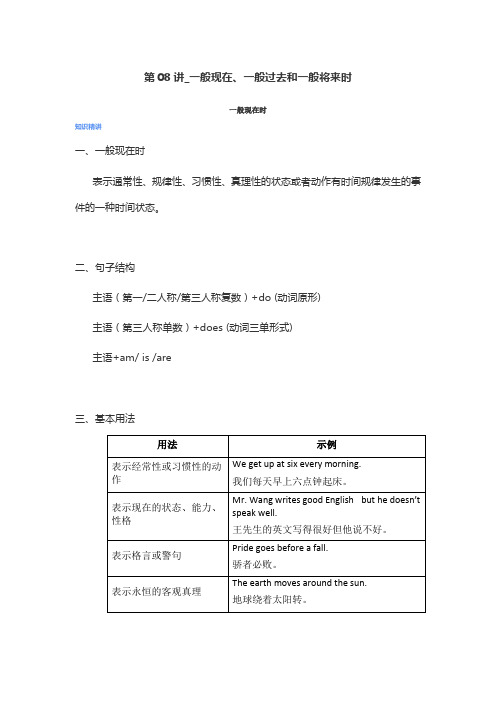
一般现在时知识精讲一、一般现在时表示通常性、规律性、习惯性、真理性的状态或者动作有时间规律发生的事件的一种时间状态。
二、句子结构主语(第一/二人称/第三人称复数)+do (动词原形)主语(第三人称单数)+does (动词三单形式)主语+am/ is /are三、基本用法四、时间状语1. 表示频率的副词: always, usually, often, sometimes, never, hardly, seldom…2. every/once+名词: every day/ week/ year, once a week/ month …3. 表示时间的短语: twice a day, on weekends, on Mondays…五、一般现在时动词三单的变化规律六、相关句式三点剖析一、考点:时态是英语学习中的核心内容之一,是英语学习的基础。
自然,时态考查是各种英语考试尤其是中考时的座上宾。
动作发生的时间决定时态,时态决定动词的形式,而考卷中的时态题通常没有给出明确的时间标志词,考试需领悟所提供的语境来做出判断。
只有推断出动作发出的正确时间,才可能正确答题,这就要求考生在熟练掌握时态结构、用法并牢记常用的时间状语的基础上,要充分利用上下文中隐含的信息来捕捉时间,找准答题的突破口。
二、重难点:一般现在时在考试中的重难点是:句子结构、基本用法、标志时间状语、动词三单的变化规则及相关句式的变化。
三、补充点:1. 表示按计划或安排好的,或将要发生的动作,可用一般现在时表将来。
但只限于start, begin, leave, go, come, arrive, return, take place等。
例:My train leaves at 7:00 this afternoon.我乘坐的火车将在今天下午7点离开。
2. 在复合句中,当主句是一般将来时,时间或条件状语从句的谓语动词只能用一般现在时来表示将来要发生的动作。
初中英语语法专项复习英语动词时态和语态讲解和练习题
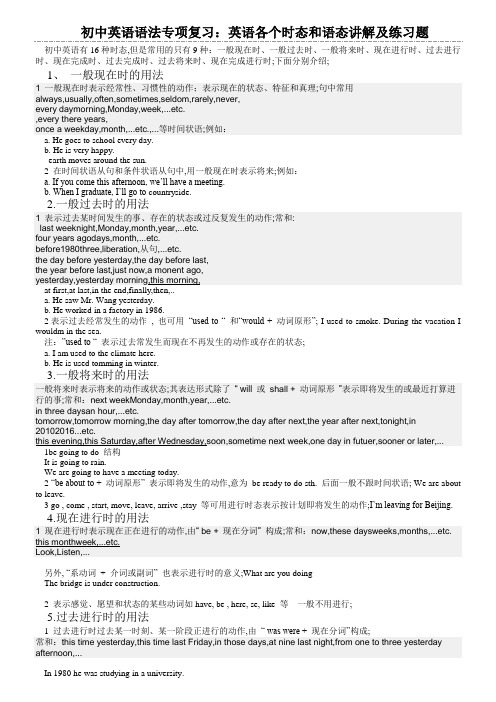
初中英语语法专项复习:英语各个时态和语态讲解及练习题初中英语有16种时态,但是常用的只有9种:一般现在时、一般过去时、一般将来时、现在进行时、过去进行时、现在完成时、过去完成时、过去将来时、现在完成进行时;下面分别介绍;1、一般现在时的用法1 一般现在时表示经常性、习惯性的动作;表示现在的状态、特征和真理;句中常用always,usually,often,sometimes,seldom,rarely,never,every daymorning,Monday,week,...etc.,every there years,once a weekday,month,...etc.,...等时间状语;例如:a. He goes to school every day.b. He is very happy.earth moves around the sun.2 在时间状语从句和条件状语从句中,用一般现在时表示将来;例如:a. If you come this afternoon, we’ll have a meeting.b. When I graduate, I’ll go to countryside.2.一般过去时的用法1 表示过去某时间发生的事、存在的状态或过反复发生的动作;常和:last weeknight,Monday,month,year,...etc.four years agodays,month,...etc.before1980three,liberation,从句,...etc.the day before yesterday,the day before last,the year before last,just now,a monent ago,yesterday,yesterday morning,this morning,at first,at last,in the end,finally,then,..a. He saw Mr. Wang yesterday.b. He worked in a factory in 1986.2表示过去经常发生的动作, 也可用“used to “ 和“would + 动词原形”; I used to smoke. During the vacation I wouldm in the sea.注:”used to “ 表示过去常发生而现在不再发生的动作或存在的状态;a. I am used to the climate here.b. He is used tomming in winter.3.一般将来时的用法一般将来时表示将来的动作或状态;其表达形式除了“ will 或shall + 动词原形”表示即将发生的或最近打算进行的事;常和:next weekMonday,month,year,...etc.in three daysan hour,...etc.tomorrow,tomorrow morning,the day after tomorrow,the day after next,the year after next,tonight,in 20102016...etc.this evening,this Saturday,after Wednesday,soon,sometime next week,one day in futuer,sooner or later,...1be going to do 结构It is going to rain.We are going to have a meeting today.2 “be about to + 动词原形” 表示即将发生的动作,意为be ready to do sth. 后面一般不跟时间状语; We are about to leave.3 go , come , start, move, leave, arrive ,stay 等可用进行时态表示按计划即将发生的动作;I’m leaving for Beijing.4.现在进行时的用法1 现在进行时表示现在正在进行的动作,由“ be + 现在分词” 构成;常和:now,these daysweeks,months,...etc. this monthweek,...etc.Look,Listen,...另外, “系动词+ 介词或副词” 也表示进行时的意义;What are you doingThe bridge is under construction.2 表示感觉、愿望和状态的某些动词如have, be , here, se, like 等一般不用进行;5.过去进行时的用法1 过去进行时过去某一时刻、某一阶段正进行的动作,由“ was were + 现在分词”构成;常和:this time yesterday,this time last Friday,in those days,at nine last night,from one to three yesterday afternoon,...In 1980 he was studying in a university.He was reading a novel when I came in.6.现在完成时的用法现在完成时由“have/has + 过去分词.其使用有两种情况:1 现在完成时所表示的动作在说话之前已完成,但对现在有影响;句中没有具体时间状语;常和:just,alreadly,yet,never,ever,now,before,this week,today,these days,once,twice,three times,...He has gone to Fuzhou.He has been to Fuzhou.2 现在完成时所表示的动作开始于过去,持续到现在,也许还会持续下去常用for 和since表示一段时间的状语或since then1949,last Monday,two o'clock,从句...,etc.,ever since then,for three daysa long time,two hours,...etc.so far , now, today, this wek month, year 等表示包括现在内的状语;He has studied English for 5 years.He has studied English since 1985.Now I have finished the work..注意:表示短暂时间动作的词如come, go , die, marry, buy 等的完成时不能与for, since 等表示一般时间的词连用;正确:I have bought the book already.错误:I have bought the book for two years.改:I have had the bookl for two years.7.过去完成时的用法1 过去完成时由“had + 过去分词”构成;过去完成时的动作表示过去某一时刻或某一时刻或某一动作之前完成的动作或状态;句中常用by then1977,yesterday,eight last night,the time we got there,...etc.by the end of last termweek,year,month,...etc..by, before, until, when 等词引导的时间状语;By the end of last year we had built five new houses.I had learnt 5000 words before I entered the university.2过去完成时的动词还可表示过去某一时刻之前发生的动作或状态持续到过去某个时间或持续下去;Before he slept, he had worked for 12 hours.8.过去将来时的用法过去将来时表示从过去的某个时间看来将要发生的动作或存在的状态;过去将来时由“should 或would + 动词原形” 构成;第一人称用should, 其他人称用would. ;常和:They were sure that they would succeed.二动词语态1.当句子的主语是动作的执行者时, 谓语的形式叫主动语态;句子的主语是动作承受者时,谓语的形式叫被动作语态;被动语态由助动词be + 过去分词构成,时态通过be 表现出来;1 一般现在时:You are required to do this.2 一般过去时:The story was told by her.3 一般将来时:The problem will be discussed tomorrow.4 现在进行时:The road is being widened.5 过去进行时:The new tool was being made.6 现在完成时:The novel has been read.7 过去完成时:He said that the work had been finished.8 过去将来时:He said that the trees would be planted soon.2. 一些特殊的被动结构1 带情态动词的被动结构:The problem must be solved soon.2 带不定式的被动结构:The room is going to be painted.The homework needs to be done with care.3 短语动词的被动:a.不及物动词+介词:若这类短语动词是及物性的,则可用于被动语态中,如:laugh at, look after, talk about, think of 等;若这类短语动词是不及物性的则不可用于被动语态中,如:book up, look down. 等b.及物动词+副词:bring about, carry out, find out, make out, put away, put off, take up, turn down, turn out, wipe out 等c. 动词+副词+介词:do away with, face up to, give into ,look down upon, make up with等d. 动词+名词+介词:catch sight of, keep on eye on, make a fool of , pay attention to , put an end to , set fire/light to , take notice of 等4 带复合宾语的动词在改为被动语态时,一般把主动结构中的宾语改为主语,宾语补足语保留在谓语后面;We always keep the classroom clean.比较:The classroom is always kept clean.5主动形式表示被动意义的词;常见的有:a.主动形式,这时动名词同句中的主语有动宾关系;The children need looking after.The windows wants /requires repairing.This point deserves mentioning.练习题1. It is a fine day. The sun __________shine brightly.2. They ___________visit the Science Museum next Sunday.3. Mr Brown________live in Beijing since he came to China.4. Mr Wang ________teach us English two years ago.5. The Smiths _______________ watch TV at this time last night.6. We __________learn about ten English songs by the end of last term.7. Father said that he ____________buy a new bike for me the next Friday.8. Bill isn¡¯t here. He ___________chat with his friends in the classroom.9. The teacher said that the moon __________go round the earth.10. The Young Pioneers will go to the zoo if it ____________not rain this Sunday.11. Listen They __________talk about the new film.12. Jim asked us what ___________happen in China in 1976.13. My mobile phone ___________steal on a bus last week.14. The host ____________interview the little boy just now.15. The Greens __________watch TV now.16. He said that he _____________ring me up when he got there.17. We ____________learn English for about three years.18. My brother_____________join the League in 1997.19. The farmers __________pick apples when I saw them.20. The red skirt __________cost the girl forty yuan.21. The film ____________begin when I got to the cinema.22. The girl told me that she wanted to be an English teacher when she _____grow up.23. My sister is a student and she _____________study at a middle school nearby.24. Mr Green __________travel to several places in South China since he came here.25. You _________catch the early bus if you get up early.26. _______you been________wear glasses all the time27. I’ll go home as soon as I _______finish my homework.29. Most science books are ______write in English.30. I ____________stay there for two months last year.31. Tell Lily to call me as soon as she _______.A. will arriveB. gets thereC. has goneD. reach here32. ----Hi, Kate. You look tired. What’s the matter ----I ______ well last night.A. didn’t sleepB. don’t sleepC. haven’t sleptD. won’t sleep33. ----Excuse me, look at the sign over there, please. Could you stop smoking----Sorry, I ____ that.A. didn’t seeB. don’t seeC. won’t seeD. can’t see34. ----Well, I found this. I think it must be yours. ----My watch Thank you. Where _____itA. do you findB. had you foundC. were you findingD. did you find35. ----Don you know when Dr White ____ for dinner this evening----No, but I think he ____ when he is free.A. will come; comesB. will come; will comeC. comes; comesD. comes; will come36. Look at those black clouds. It _____ rain. Let’s hurry. A. maybe B. would C. has D. is going to37. ----Jimmy is leaving for a holiday. ----Really Where ____ he ____A. has; goneB. will; goC. did; goD. does; go38. ----Shall we go shopping now ---Sorry, I can't. I ____ my shirts.A. washB. washesC. washedD. am washing39. ----I called you yesterday evening, but there was no answer.----Oh, I am sorry. I ___ dinner at my friend's home.A. haveB. hadC. was havingD. have had40. The Oriental Pearl TV Tower ____ thousands of visitors since 1995.A. attractedB. attractsC. has attractedD. will attract46. ----Why didn't you go to the cinema yesterday -----Because I ____ the film before.A. had seenB. have seenC. have watchedD. has watched47. I don't think John saw me. He ____ a book at that moment.A. just readB. has just readC. was just readingD. had just read48. Mr Smith ____ a book about China last year but I don't know whether he has finished it.A. has writtenB. wroteC. had writtenD. was writing49. Mr White ____ the newspaper while his daughter ____TV.A. has read; was watchingB. was reading; watchedC. was reading; was watchingD. reading; watched50. ---- I ____ you at the meeting. Why ----I was ill. A. saw B. have seen C. not see D. didn't see51. The 29th Olympic Games ____ in Beijing in 2008. A. hold B. will hold C. will be held D. held52. Hurry up The play ____ for ten minutes. A. has been on B. has begun C. had begun D. began53. ----May I speak to Mr Smith ----Sorry, he ____ Australia. But he ____ in two days.A. has been to; will come backB. has gone to; will be backC. has been in; would come backD. is leaving for; doesn't come back54. I can't go to the theater tonight because I ____ my ticket.A. have lostB. had lostC. will loseD. was losing55. ----What a nice bike How long ____ you ____ it ----Just two weeks.A. have; boughtB. did; buyC. have; hadD. are; having56. ----I'm sorry to have kept you waiting. ----Oh, not at all. I ____ here only for a few minutes.A. have comeB. had beenC. wasD. have been57. ----____ my dictionary anywhere ---- Yes. I saw it on your desk a moment ago.A. Did you seeB. If you seeC. Had you seenD. Would you see58. We were all surprised when he mad it clear that he ____ office soon.A. leavesB. would leaveC. will leaveD. had left答案:I. 1. shines/ is shining 2. are going to/ will visit 3. has lived 4. taught5. were watching6. had learned7. would buy8. is chatting9. goes 10.doesn't rain 11. are talking 12. happened 13. was stolen 14. interviewed15. are watching16. would ring 17. have learned 18. joined 19. were picking 20. cost21. had begun 22. grew 23. studies 24. has traveled 25. will catch26. Have; wearing 27. finish 28. haven't heard 29. written 30. stayedII. 31--35 BAADB 36--40 DBDCC 41--45 ACBAC 46--50 ACDCD51--55 CABAC 56--60 DABDA 61--65 BDBAB 66-70 BDABC 71--75 BCADD。
完整word版一般过去时讲解 练习含答案推荐文档
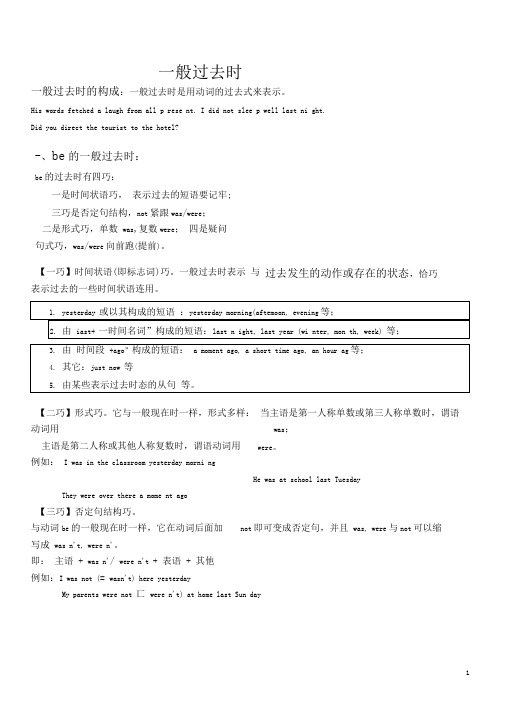
一般过去时一般过去时的构成:一般过去时是用动词的过去式来表示。
His words fetched a laugh from all p rese nt. I did not slee p well last ni ght.Did you direct the tourist to the hotel?-、be 的一般过去时:be 的过去时有四巧:一是时间状语巧, 表示过去的短语要记牢;三巧是否定句结构,not 紧跟was /were ;二是形式巧,单数 was ,复数were ; 四是疑问句式巧,was /were 向前跑(提前)。
【一巧】时间状语(即标志词)巧。
一般过去时表示 与表示过去的一些时间状语连用。
【二巧】形式巧。
它与一般现在时一样,形式多样: 当主语是第一人称单数或第三人称单数时,谓语动词用was ; 主语是第二人称或其他人称复数时,谓语动词用例如: I was in the classroom yesterday morni ngHe was at school last Tuesday They were over there a mome nt ago 【三巧】否定句结构巧。
与动词be 的一般现在时一样,它在动词后面加not 即可变成否定句,并且 was, were 与not 可以缩写成 was n't, were n'。
即: 主语 + was n'/ were n't + 表语 + 其他例如:I was not (= wasn't) here yesterdayMy parents were not 匸 were n't) at home last Sun day 过去发生的动作或存在的状态,恰巧 were 。
【四巧】疑问句式巧。
把was, were提到句首,句末用问号即可变为一般疑问句。
即:Was(Were) + 主语 +表语 + 其他?例如:Were you at home the day before yesterday Was she late this morning? 肯定回答用“ Yes主语+ was/ were. ”;否定回答用“ N主语+ was n'/ were n't. ”例如:--Were Wei Hua and Han Mei here just now? --Yes, they were (No, they were n't .)二、一般过去时的用法(一)一般过去时的基本用法a.表示过去 某个特定时间 发生的动作 或存在的状态例如: He sudde niy fell ill yesterday. The engine stopped because the fuel was used up. 注意:在一般过去时的句子中,通常都要有表示过去的时间状语。
初中英语语法详解与练习----一般过去时

初中英语语法GRAMMAR----一般过去时1. He was here only a few minutes ago.(仅仅几分钟前他还在这里。
)2. I came home just now.(我刚回到家。
)3. I got up very early this morning.(今天早晨我起床很早。
)4. He was late for school again today.(今天他又迟到了。
)A 基本用法现在进行时用于:1. 表示过去某时间发生的动作或存在的状态;2. 表示过去的习惯或经常发生的动作;3. 表示过去发生的连贯的一系列动作。
B 谓语部分的构成【句中动词变为相应的过去式】I went to school.I was twelve years old.C 动词过去式的规则变化D 规则变化的读音1. 清—清[♦] stop—stopped[♦♦ ☐♦]jump—jumped[♎✞✈❍☐♦]2. 浊—浊[♎] use—used[ ◆♎] move—moved[❍◆♎]3. 元—浊[♎] stay-stayed[♦♦♏✋♎] play—played[☐●♏✋♎]4.[♦][♎]—[✋♎] want—wanted[ ♦ ⏹♦✋♎]need—needed[ ⏹♓♎✋♎]E时间状语(暗示点)yesterday 昨天the day before yesterday前天in 1980 (过去年份)last night 昨晚(week, Sunday, weekend, month, winter, year, century 世纪)this morning/afternoon/evening 今天早晨/今天下午/今天傍晚“一段时间+ago” 这段时间之前in the past 在过去just now刚刚the other day不久前的一天at the age of 10 (过去年龄段)十岁的时候in the old days,one day, long ago, once upon a tame etc.F难度提升a.1. -Have you had your lunch? 你吃过午饭了吗?(你现在饿吗?)-Yes, I have. 是的,我已经吃过了。
初中英语语法八大时态之一般过去时
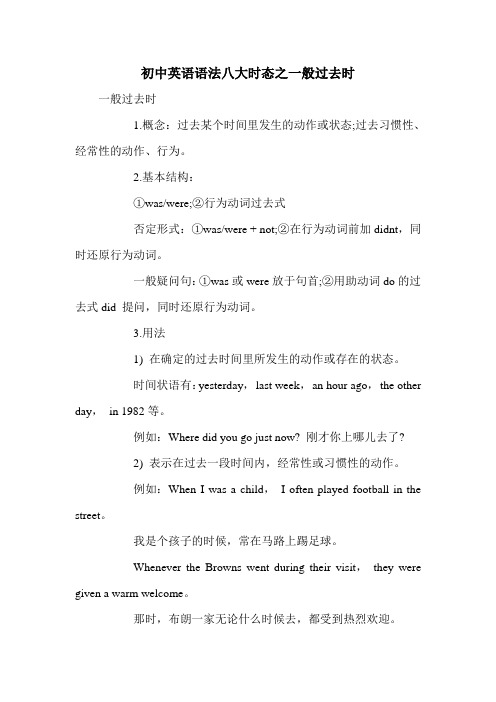
初中英语语法八大时态之一般过去时
一般过去时
1.概念:过去某个时间里发生的动作或状态;过去习惯性、经常性的动作、行为。
2.基本结构:
①was/were;②行为动词过去式
否定形式:①was/were + not;②在行为动词前加didnt,同时还原行为动词。
一般疑问句:①was或were放于句首;②用助动词do的过去式did 提问,同时还原行为动词。
3.用法
1) 在确定的过去时间里所发生的动作或存在的状态。
时间状语有:yesterday,last week,an hour ago,the other day,in 1982等。
例如:Where did you go just now? 刚才你上哪儿去了?
2) 表示在过去一段时间内,经常性或习惯性的动作。
例如:When I was a child,I often played football in the street。
我是个孩子的时候,常在马路上踢足球。
Whenever the Browns went during their visit,they were given a warm welcome。
那时,布朗一家无论什么时候去,都受到热烈欢迎。
注意:used to + do:过去常常表示过去习惯性的动作或状态,但如今已不存在。
例如:Mother used not to be so forgetful。
老妈过去没那么健忘。
Scarf used to take a walk。
斯卡夫过去常常散步。
初中英语语法——一般过去时讲解与练习

The pronunciation of the Past of Regular Verbs
• /t/ when the infinitive ends in a VOICELESS Consonant ( /p/,
/k/,/ks/, /s/ , /f/, /h/, /Í/, /S/ ).
e.g. liked /laikt/ watched /wQÍt/ stopped /stQpt/
EXERCISE: Complete the text with the PAST
form of the verbs in brackets.
• Shakira is perhaps the most recognizable voice in Latin pop/rock today. When she ------(BE) only 8, she-----(DEDICATE) her first song called "Tus gafas oscuras", to her father. Two years later, she------(WIN) local and national talent contests. By 13, she had signed a record deal with Sony in Colombia, which-----(RESULT) in her first album, "Magia (Magic)", a compilation of songs she-----(WRITE) between 8 and 13 years old. She was chosen to represent her country at the Festival OTI in Spain. But she was under the minimum age of 16 and she ------(CAN NOT) participate. So instead, Shakira ------(RECORD) a second album of original material, "Peligro (Danger)". At that point, Shakira-----(TAKE) a break from music, -----(GRADUATE) from high school (at age 15-really) and back with a vengeance. The result was the phenomenally successful "Pies Descalzos" which-----(SELL) more than four million copies worldwide. In addition, this determined girl ------(WANT) to try her luck as an actress in "Oasis", a soap opera, but she --------(THINK) music was her life instead of TV. Then she---- (BEGIN) to be very popular: the Colombian government-------- (DESIGNATE) Shakira as an official goodwill ambassador.
(完整版)一般过去时讲解及练习
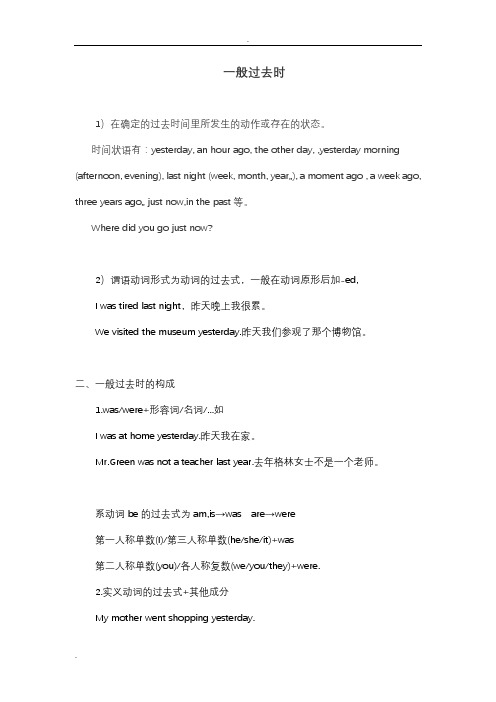
一般过去时1)在确定的过去时间里所发生的动作或存在的状态。
时间状语有:yesterday, an hour ago, the other day, ,yesterday morning (afternoon, evening), last night (week, month, year…), a moment ago , a week ago, three years ago… just now,in the past等。
Where did you go just now?2)谓语动词形式为动词的过去式,一般在动词原形后加-ed,I was tired last night,昨天晚上我很累。
We visited the museum yesterday.昨天我们参观了那个博物馆。
二、一般过去时的构成1.was/were+形容词/名词/...如I was at home yesterday.昨天我在家。
Mr.Green was not a teacher last year.去年格林女士不是一个老师。
系动词be的过去式为am,is→was are→were第一人称单数(I)/第三人称单数(he/she/it)+was第二人称单数(you)/各人称复数(we/you/they)+were.2.实义动词的过去式+其他成分My mother went shopping yesterday.我妈妈昨天去购物了。
His uncle worked in Beijing in 2014.他叔叔2014年在北京工作。
三、一般过去时的句式四、动词过去式的变化规则3 used toused to + do:"过去常常"表示过去习惯性的动作或状态,但如今已不存在。
Mother used to take a walk. (过去常常散步)二、构成及变化1. Be动词在一般过去时中的变化:am 和is在一般过去时中变为was。
(完整版)中考时态专题一般过去时详细讲解及练习
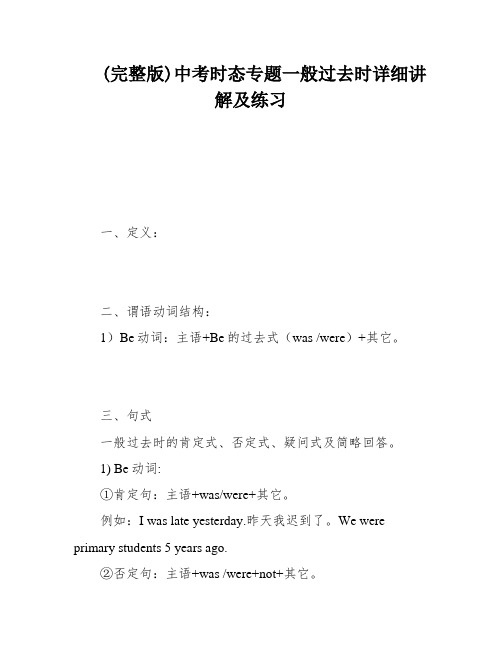
(完整版)中考时态专题一般过去时详细讲解及练习一、定义:二、谓语动词结构:1)Be动词:主语+Be的过去式(was /were)+其它。
三、句式一般过去时的肯定式、否定式、疑问式及简略回答。
1) Be动词:①肯定句:主语+was/were+其它。
例如:I was late yesterday.昨天我迟到了。
We were primary students 5 years ago.②否定句:主语+was /were+not+其它。
例如:___(我们昨天没迟到)③一般疑问句:be动词提前。
Was/Were+主语+其它?例如:I was ___(改一般疑问句) →Were you ill yesterday?(你昨天病了吗?)肯定回答:Yes, I was. (是的,我病了。
)否定回答:No, I wasn't. (不,我没病。
)④特殊疑问句:对谓语动词进行提问的:疑问词+was/were+主语+其它(一般疑问句)?2) 实义动词:①肯定句:主语+V-ed+其它。
例如:I called up my good friend just now.②否定句:主语+didn’t+V原形+其它。
例如:I didn’t argue with Tom last week.③一般疑问句:Did+主语+V原形+其它?例如:___ 2010. (改一般疑问句) →Did you buy a souvenir in 2010?肯定回答:Yes, I did.否定回答:No, I didn’t.④特殊疑问句:疑问词+did+主语+V原形+其它?例如:When did you buy the book?(你是什么时候买的这本书?)Finally, let's fill in the blanks with the correct form of the verb. "Was" should be used for the first blank, "played" for the second, "went" for the third, and "read" for the fourth.5. Tom was upset because he had failed the English test again.6. We moved to Beijing 8 years ago.1. C2. C3. B4. A5. C6. A7. B8. ATom was ___ down because he had failed his English test once again. It had e a recurring problem for him. Eight years ago,my family and I relocated to Beijing. This morning, I asked my friend what time she had arrived at school.1. What did they have for breakfast last week?2. ___?3. Jim ___ she was ___.4. They were not late the day before yesterday.5. Where did you go?6. Did Wei Fang have a good time last summer n? Yes, she did. / No, she didn't.7. Li Hong did not do her ___.8. How did Mr Gao go to work last year?9. Is there tea in the cup?1. Did Wei Fang have a good time last summer n? Yes, she did. / No, she didn't.2. Li Hong did not do her ___.3. How did Mr Gao go to work last year?4. Is there tea in the cup?。
初中英语语法:一般现在时、一般过去时和一般将来时
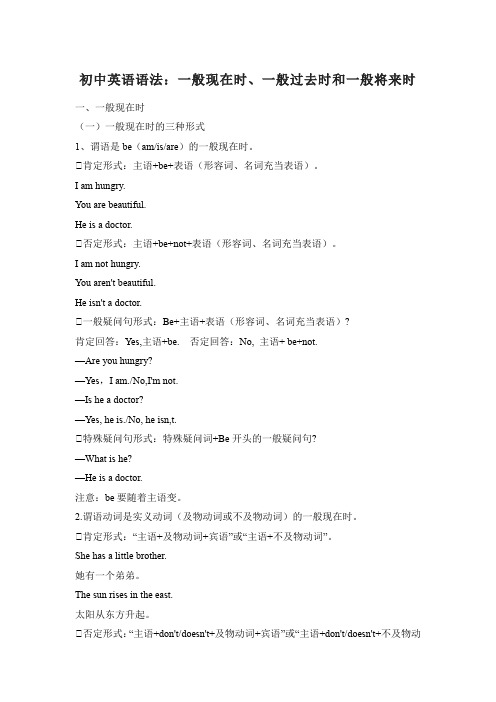
初中英语语法:一般现在时、一般过去时和一般将来时一、一般现在时(一)一般现在时的三种形式1、谓语是be(am/is/are)的一般现在时。
①肯定形式:主语+be+表语(形容词、名词充当表语)。
I am hungry.You are beautiful.He is a doctor.①否定形式:主语+be+not+表语(形容词、名词充当表语)。
I am not hungry.You aren't beautiful.He isn't a doctor.①一般疑问句形式:Be+主语+表语(形容词、名词充当表语)?肯定回答:Yes,主语+be. 否定回答:No, 主语+ be+not.—Are you hungry?—Yes,I am./No,I'm not.—Is he a doctor?—Yes, he is./No, he isn,t.①特殊疑问句形式:特殊疑问词+Be开头的一般疑问句?—What is he?—He is a doctor.注意:be要随着主语变。
2.谓语动词是实义动词(及物动词或不及物动词)的一般现在时。
①肯定形式:“主语+及物动词+宾语”或“主语+不及物动词”。
She has a little brother.她有一个弟弟。
The sun rises in the east.太阳从东方升起。
①否定形式:“主语+don't/doesn't+及物动词+宾语”或“主语+don't/doesn't+不及物动词”。
She doesn't have a little brother.她没有弟弟。
I don't eat every morning.我每天早晨都不吃饭。
①一般疑问句形式:“Do/Does+主语+及物动词原形+宾语”或“Do/Does+主语+不及物动词原形”。
肯定回答:Yes,主语+do/does. 否定回答是:No, 主语+ don't/doesn't.—Do you eat every morning?—Yes, I do./No, I don't.—Does she have a little brother?—Yes, she does./No, she doesn't.①特殊疑问句:特殊疑问词+do/does开头的一般疑问句?What do you like?When do you go to school?注意:根据主语确定用do还是does。
初中英语八大时态的详细讲解与练习
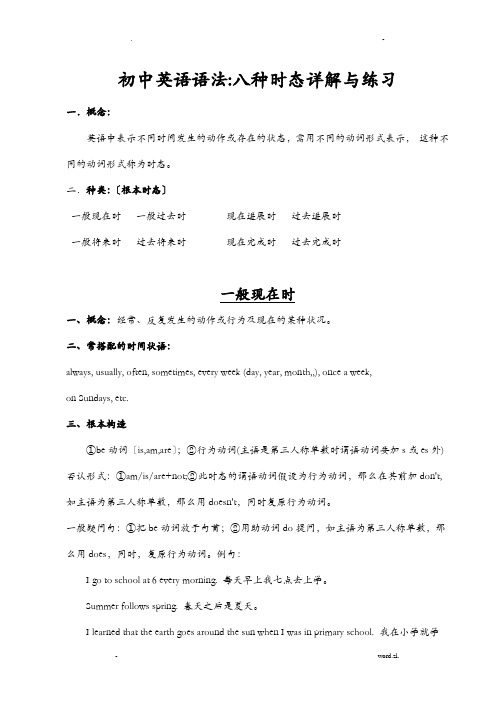
初中英语语法:八种时态详解与练习一.概念:英语中表示不同时间发生的动作或存在的状态,需用不同的动词形式表示,这种不同的动词形式称为时态。
二.种类:〔根本时态〕一般现在时一般过去时现在进展时过去进展时一般将来时过去将来时现在完成时过去完成时一般现在时一、概念:经常、反复发生的动作或行为及现在的某种状况。
二、常搭配的时间状语:always, usually, often, sometimes, every week (day, year, month…), once a week,on Sundays, etc.三、根本构造①be动词〔is,am,are〕;②行为动词(主语是第三人称单数时谓语动词要加s或es外) 否认形式:①am/is/are+not;②此时态的谓语动词假设为行为动词,那么在其前加don't,如主语为第三人称单数,那么用doesn't,同时复原行为动词。
一般疑问句:①把be动词放于句首;②用助动词do提问,如主语为第三人称单数,那么用does,同时,复原行为动词。
例句:I go to school at 6 every morning. 每天早上我七点去上学。
Summer follows spring. 春天之后是夏天。
I learned that the earth goes around the sun when I was in primary school. 我在小学就学过地球是围绕太阳转的。
Pride goes before a fall. 骄者必败。
四、根本用法:1) 描述当前时间经常出现、反复发生的动作或存在的状态。
在这种情景中,句子常带有表示频率的时间状语:always , everyday , often , once a week (month , year , etc.) , sometimes , seldom , usually等等,以表示句中的动作或状态是习惯性的、经常性的。
英语一般过去时X知识点总结及经典习题(含答案)含答案
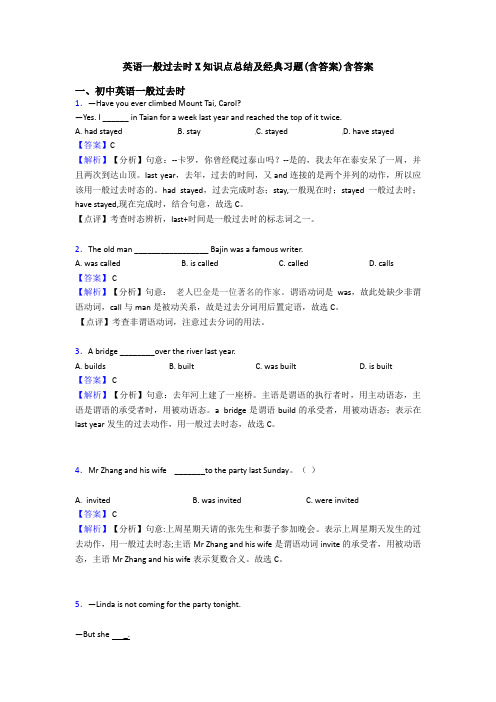
英语一般过去时X知识点总结及经典习题(含答案)含答案一、初中英语一般过去时1.—Have you ever climbed Mount Tai, Carol?—Yes. I ______ in Taian for a week last year and reached the top of it twice.A. had stayedB. stayC. stayedD. have stayed【答案】C【解析】【分析】句意:--卡罗,你曾经爬过泰山吗?--是的,我去年在泰安呆了一周,并且两次到达山顶。
last year,去年,过去的时间,又and连接的是两个并列的动作,所以应该用一般过去时态的。
had stayed,过去完成时态;stay,一般现在时;stayed一般过去时;have stayed,现在完成时,结合句意,故选C。
【点评】考查时态辨析,last+时间是一般过去时的标志词之一。
2.The old man _________________ Bajin was a famous writer.A. was calledB. is calledC. calledD. calls【答案】 C【解析】【分析】句意:老人巴金是一位著名的作家。
谓语动词是was,故此处缺少非谓语动词,call与man是被动关系,故是过去分词用后置定语,故选C。
【点评】考查非谓语动词,注意过去分词的用法。
3.A bridge ________over the river last year.A. buildsB. builtC. was builtD. is built【答案】 C【解析】【分析】句意:去年河上建了一座桥。
主语是谓语的执行者时,用主动语态,主语是谓语的承受者时,用被动语态。
a bridge是谓语build的承受者,用被动语态;表示在last year发生的过去动作,用一般过去时态,故选C。
4.Mr Zhang and his wife _______to the party last Sunday。
- 1、下载文档前请自行甄别文档内容的完整性,平台不提供额外的编辑、内容补充、找答案等附加服务。
- 2、"仅部分预览"的文档,不可在线预览部分如存在完整性等问题,可反馈申请退款(可完整预览的文档不适用该条件!)。
- 3、如文档侵犯您的权益,请联系客服反馈,我们会尽快为您处理(人工客服工作时间:9:00-18:30)。
一般过去时主要表示过去某时发生的动作或情况。
一:可以从以下几个方面来理解:1)过去某个时间所发生的动作或存在的状态。
e.g. I bought a new shirt yesterday. He was a worker two years ago.2)过去一段时间内,经常性或习惯性的动作。
e.g. When I was a child,I often played with fire. Li Lei always walked to school last term.3)谈到已故人的情况时多用过去时。
e.g. Lu Xun was a great writer.4)有些发生时间不是很清楚的情况,实际是过去发生的,也应用过去时态。
e.g. What did you say?另外,还可用过去时表示委婉的语气。
e.g. Could you lend me your pen?二其结构是"主语+动词的过去式"be动词的过去式为was, were;行为动词的过去式有规则变化和不规则变化两种,规则变化有以下几种情况:1)直接在动词原形末尾加-ed. e.g. work-----worked; ask------asked;2)以e结尾的动词只加-d. e.g. arrive-----arrived; like-----liked.3)末尾只有一个辅音字母的重读闭音节,应先双写这个辅音字母,再加-ed. e.g. shop-----shopped;4)以"辅音字母+y"结尾的动词,先把y变成i,再加-ed. e.g. carry----carried; study------studied.有些动词变过去式是不规则的,e.g. fly------flew; break-----broke; teach-----taught.三其句式变化分为两种情况、1)含有be动词的依然在be上做文章. e.g. I was born in 1980. I was not born in 1980. Were you born in 1980?2)含有行为动词的变否定句要在行为动词前加助动词didn't.,同时把动词变成原形; 变一般疑问句,在句首加助动词did,同时把动词变成原形. e.g. I bought a gift for my mum yesterday. I didn't buy a gift for my mum yesterday. Did you buy a gift for your mum yesterday?四其时间状语为1 yesterday或由其构成的短语,e.g. yesterday morning; 2 由"last+时间"构成的短语, e.g. last year;3由"时间段+ago"构成的短语, e.g. three days ago; 4 还有on the morning of Monday, just now等,以及一些表示过去时态的从句. 注意,在宾语从句中主句为过去,一般从句也为过去.五常见错误如下:《1》把动词变成过去式易出错例: 1 They stoped (stop) talking just now. 2 They plaied (play) football yesterday. 答案: 1 stopped 2 played解析:我们可以记住下面的口诀:"动词变成过去式,双写规律要牢记;y前若是辅音字,y变i加-ed;y前若是元音字,只须直接加-ed."《2》忘记把动词变成过去式例: I fly (fly) kites on the afternoon of Sunday.答案: flew 解析:我们可以记住下面的口诀:"一般过去时态里,过去形式莫忘记".《3》在句式变换时易出错例: 1 We didn't went (not go) out last Friday. 2 Did you had (have) a good time yesterday? 解析:请记住口诀"见助动, 用原形."《4》易与单三人称作主语的一般现在时弄混例: He taughts (teach) me English last year.解析:行为动词的过去式无人称和数的变化.即使主语是单三人称,也和其它人称所用动词的形式一样.《5》易与现在完成时弄混例: 我看过这部电影I saw(see) the film.答案: I have seen (see) the film. 解析:"我看过这部电影"说明我了解这部电影的内容,强调现在的情况,应用现在完成时; 一般过去时态的句子只是说明我看了这场电影,与现在无关..《6》易与过去进行时弄混,这里不在重复。
(一)选择1 She lived there before he____to China.A. came B. comes C. come D. coming2 I _____but_____nothing. A . was listened; was hearing B. listened; heard C . have listened; heard D. listened; heard of3 When did you ____here? A. got to B. reached C. arrive in D. reach4 I____my homework at 7:00 yesterday evening. A. finished B. would finish C. was finishing D. finish5 -He didn't go shopping with you yesterday afternoon, did he? - _______.A. No, he doesn'tB. Yes, he didn'tC. No, he didD. Yes, he did.6 -I have had supper. - When ____you____it? A. have; had B. do, have C. did,have D. will have (二)填空1 They____(be) on the farm a moment ago.2 There____(be)a shop not long ago.3 Jenny____(not go)to bed until 11:00 o'clock last night.4 Danny _____(read )English five minutes ago.5 I _____(see)Li Lei ____(go) out just now.6 He ____(do)his homework every day. But he __(not do)it yesterday.7 When I was young, I _____(play)games with my friends.8 When ____you_____(write)this book? I _____it last year. 9 Did he____(have) lunch at home?10 I _____(eat) the bread, I 'm full now.请用正确动词形式填空。
1. I _____(have) an exciting party last weekend.2. _________ she ______(practice) her guitar yesterday? No, she _________.3. What ________ Tom ________ (do) on Saturday evening? He ________(watch) TV and __________(read) an interesting book.4. They all _________(go) to the mountains yesterday morning.5. She _________(not visit) her aunt last weekend. She ________ (stay) at home and _________(do) some cleaning.6. When ________ you _________(write) this song? I __________(write) it last year.7. My friend, Carol, ________(study) for the math test and ________(practice) English last night.8. ________ Mr. Li __________(do) the project on Monday morning? Yes, he _________.9. How _________(be) Jim's weekend? It _________(be not) bad.10. ________ (be) your mother a sales assistant last year? No. she __________.二、用所给词的适当形式填空1.He put the books away and (go) home. 2. The boy is running and (tie) his shoes on the playground.3. My father (buy) a new computer for (I ) yesterday.4. He often (go) to school by bike, but last year he often (walk) to school.5. After she finished (pack) everything, she (go) to bed.6. ---- Who (wash) the plates on the table ?---- Jenny did.7. ---- When you (see ) the film “ Titanic”?8. It’s half past eleven now. Jim (have) lunch. He ususlly (have) it at this time.9. She (write) to Jill last month. She (write) to him next time.10. The students (stop) talking when their teacher came up.三、单句改错:下面每句均有一处错误,指出并加以改正1. Did you found the answer to this question?2. Mary and her brother was born on the sameday.3. We start this lesson about ten minutes ago.4. She hadn’t anything for breakfast this morning.5. They came here for a year.6. Amy singed a song for us at that party.7. He said he will help me with my English when he was free.8. The man saw the bag until it was late.。
